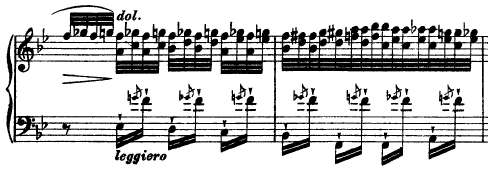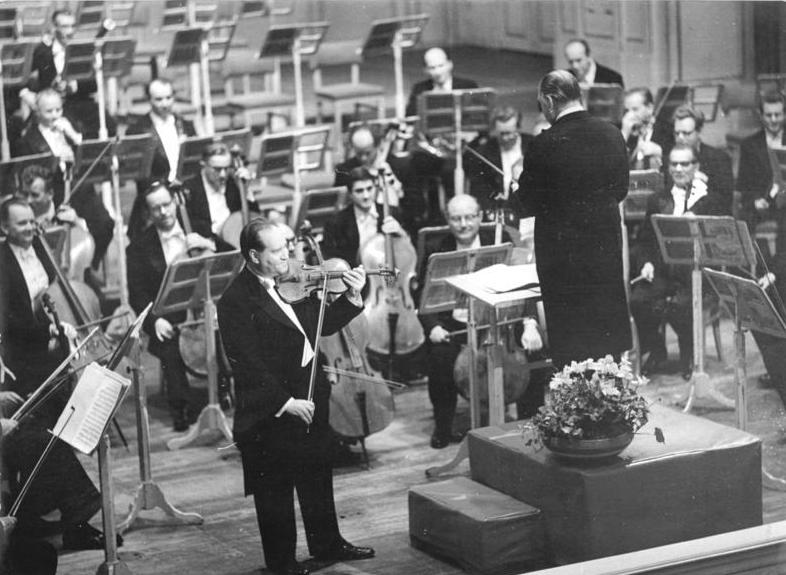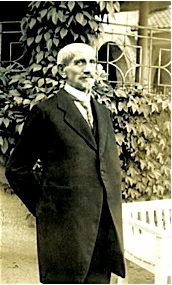|
Piano Sextet (Lyapunov)
Sextet in B minor, Op. 63 is the only piece of chamber music by Russian composer Sergei Lyapunov. It is scored for a rather unusual ensemble of piano, 2 violins, viola, cello and double bass. A typical performance takes 35–40 minutes. Composition history Lyapunov worked on the Sextet in January—March 1916, and the first performance took place on 30 April that year in a concert at the Petrograd Conservatory with the composer playing the piano part. It was one of the most important concerts in Lyapunov's career, in the second half of which the complete cycle of his ''Transcendental Études'' was performed for the first time in Russia. Soon after that, the fair copy of the sextet was mislaid by composer in his country house (all the drafts and rough copies were destroyed by him, according to his habit), while the work was already been in print. However, in a war-time accident, all the printed copies were lost. Some portions of the proofs survived, and some separate instrumental ... [...More Info...] [...Related Items...] OR: [Wikipedia] [Google] [Baidu] |
B-flat Minor
B-flat minor is a minor scale based on B, consisting of the pitches B, C, D, E, F, G, and A. Its key signature has five flats. Its relative major is D-flat major and its parallel major is B-flat major. Its enharmonic equivalent, A-sharp minor, which would contain seven sharps, is not normally used. The B-flat natural minor scale is: : Changes needed for the melodic and harmonic versions of the scale are written in with accidentals as necessary. The B-flat harmonic minor and melodic minor scales are: : : Characteristics B-flat minor is traditionally a 'dark' key. The old valveless horn was barely capable of playing in B-flat minor: the only example found in 18th-century music is a modulation that occurs in the first minuet of Franz Krommer's Concertino in D major, Op. 80. Notable classical compositions * Charles-Valentin Alkan ** '' Prelude Op. 31'', No. 12 (Le temps qui n'est plus) ** Symphony for Solo Piano, 3rd movement: Menuet *Samuel Barber **''Ada ... [...More Info...] [...Related Items...] OR: [Wikipedia] [Google] [Baidu] |
Chamber Music
Chamber music is a form of classical music that is composed for a small group of instruments—traditionally a group that could fit in a palace chamber or a large room. Most broadly, it includes any art music that is performed by a small number of performers, with one performer to a part (in contrast to orchestral music, in which each string part is played by a number of performers). However, by convention, it usually does not include solo instrument performances. Because of its intimate nature, chamber music has been described as "the music of friends". For more than 100 years, chamber music was played primarily by amateur musicians in their homes, and even today, when chamber music performance has migrated from the home to the concert hall, many musicians, amateur and professional, still play chamber music for their own pleasure. Playing chamber music requires special skills, both musical and social, that differ from the skills required for playing solo or symphonic works. ... [...More Info...] [...Related Items...] OR: [Wikipedia] [Google] [Baidu] |
Sergei Lyapunov
Sergei Mikhailovich Lyapunov (or Liapunov; russian: Серге́й Миха́йлович Ляпуно́в, ; 8 November 1924) was a Russian composer, pianist and conductor. Life Lyapunov was born in Yaroslavl in 1859. After the death of his father, Mikhail Lyapunov, when he was about eight, Sergei, his mother, and his two brothers (one of them was Aleksandr Lyapunov, later a notable mathematician) went to live in the larger town of Nizhny Novgorod. There he attended the grammar school along with classes of the newly formed local branch of the Russian Musical Society. On the recommendation of Nikolai Rubinstein, the Director of the Moscow Conservatory of Music, he enrolled in that institution in 1878. His main teachers were Karl Klindworth (piano; a former pupil of Franz Liszt), and Sergei Taneyev (composition; a former pupil of Pyotr Ilyich Tchaikovsky and his successor at the Conservatory). He graduated in 1883, more attracted by the nationalist elements in music of the New Russ ... [...More Info...] [...Related Items...] OR: [Wikipedia] [Google] [Baidu] |
Saint Petersburg Conservatory
The N. A. Rimsky-Korsakov Saint Petersburg State Conservatory (russian: Санкт-Петербургская государственная консерватория имени Н. А. Римского-Корсакова) (formerly known as the Petrograd Conservatory and Leningrad Conservatory) is a school of music in Saint Petersburg, Russia. In 2004, the conservatory had around 275 faculty members and 1,400 students. History The conservatory was founded in 1862 by the Russian Music Society and Anton Rubinstein, a Russian pianist and composer. On his resignation in 1867, he was succeeded by Nikolai Zaremba. Nikolai Rimsky-Korsakov was appointed as a professor in 1871, and the conservatory has borne his name since 1944. In 1887, Rubinstein returned to the conservatory with the goal of improving overall standards. He revised the curriculum, expelled inferior students, fired and demoted many professors, and made entrance and examination requirements more stringent. In 1891, he r ... [...More Info...] [...Related Items...] OR: [Wikipedia] [Google] [Baidu] |
Transcendental Études (Lyapunov)
The ''Transcendental Études'' (french: Études d'exécution transcendante, links=no), S.139, are a set of twelve compositions for piano by Franz Liszt. They were published in 1852 as a revision of an 1837 set (which had not borne the title "d'exécution transcendante"), which in turn were – for the most part – an elaboration of a set of studies written in 1826. History The genesis of the ''Transcendental Études'' goes back to 1826, when 15-year-old Liszt wrote a set of youthful exercises called the ''Étude en douze exercices'' (Study in twelve exercises), S.136. These pieces were not particularly technically demanding. Liszt then returned to these pieces for thematic ideas, elaborating on them considerably, in the composition of the ''Douze Grandes Études'' (Twelve Grand Studies), S.137, which were published in 1837. The ''Transcendental Études'', S.139, are revisions of the ''Douze Grandes Études''. The fourth was altered and published alone as ''Mazeppa'' in l ... [...More Info...] [...Related Items...] OR: [Wikipedia] [Google] [Baidu] |
World War I
World War I (28 July 1914 11 November 1918), often abbreviated as WWI, was one of the deadliest global conflicts in history. Belligerents included much of Europe, the Russian Empire, the United States, and the Ottoman Empire, with fighting occurring throughout Europe, the Middle East, Africa, the Pacific, and parts of Asia. An estimated 9 million soldiers were killed in combat, plus another 23 million wounded, while 5 million civilians died as a result of military action, hunger, and disease. Millions more died in genocides within the Ottoman Empire and in the 1918 influenza pandemic, which was exacerbated by the movement of combatants during the war. Prior to 1914, the European great powers were divided between the Triple Entente (comprising France, Russia, and Britain) and the Triple Alliance (containing Germany, Austria-Hungary, and Italy). Tensions in the Balkans came to a head on 28 June 1914, following the assassination of Archduke Franz Ferdin ... [...More Info...] [...Related Items...] OR: [Wikipedia] [Google] [Baidu] |
National Library Of Russia
The National Library of Russia (NLR, russian: Российская национальная библиотека}), located in Saint Petersburg, is the first, and one of three national public libraries in Russia. The NLR is currently ranked among the world’s major libraries. It has the second biggest library collection in the Russian Federation, a treasury of national heritage, and is the All-Russian Information, Research and Cultural Center. Over the course of its history, the Library has aimed for comprehensive acquisition of the national printed output and has provided free access to its collections. It is known as the ''Imperial Public Library'' from 1795 to 1917; ''Russian Public Library'' from 1917 to 1925; ''State Public Library'' from 1925 to 1992 (since 1932 named after M.Y. Saltykov-Shchedrin); NLR. History Establishment The Imperial Public Library was established in 1795 by Catherine the Great. It was based on the Załuski Library, the famous Polish national libr ... [...More Info...] [...Related Items...] OR: [Wikipedia] [Google] [Baidu] |
Symphony No
A symphony is an extended musical composition in Western classical music, most often for orchestra. Although the term has had many meanings from its origins in the ancient Greek era, by the late 18th century the word had taken on the meaning common today: a work usually consisting of multiple distinct sections or movements, often four, with the first movement in sonata form. Symphonies are almost always scored for an orchestra consisting of a string section (violin, viola, cello, and double bass), brass, woodwind, and percussion instruments which altogether number about 30 to 100 musicians. Symphonies are notated in a musical score, which contains all the instrument parts. Orchestral musicians play from parts which contain just the notated music for their own instrument. Some symphonies also contain vocal parts (e.g., Beethoven's Ninth Symphony). Etymology and origins The word ''symphony'' is derived from the Greek word (), meaning "agreement or concord of sound", "concert of ... [...More Info...] [...Related Items...] OR: [Wikipedia] [Google] [Baidu] |
Violin Concerto (Lyapunov)
A violin concerto is a concerto for solo violin (occasionally, two or more violins) and instrumental ensemble (customarily orchestra). Such works have been written since the Baroque period, when the solo concerto form was first developed, up through the present day. Many major composers have contributed to the violin concerto repertoire, with the best known works including those by Bach, Bartók, Beethoven, Brahms, Bruch, Dvořák, Khachaturian, Mendelssohn, Mozart, Paganini, Prokofiev, Sarasate, Shostakovich, Sibelius, Tchaikovsky, and Vivaldi. Traditionally a three-movement work, the violin concerto has been structured in four movements by a number of modern composers, including Dmitri Shostakovich, Igor Stravinsky, and Alban Berg. In some violin concertos, especially from the Baroque and modern eras, the violin (or group of violins) is accompanied by a chamber ensemble rather than an orchestra—for instance, in Vivaldi's ''L'estro armonico'', originally scored for four vi ... [...More Info...] [...Related Items...] OR: [Wikipedia] [Google] [Baidu] |
World War II
World War II or the Second World War, often abbreviated as WWII or WW2, was a world war that lasted from 1939 to 1945. It involved the vast majority of the world's countries—including all of the great powers—forming two opposing military alliances: the Allies and the Axis powers. World War II was a total war that directly involved more than 100 million personnel from more than 30 countries. The major participants in the war threw their entire economic, industrial, and scientific capabilities behind the war effort, blurring the distinction between civilian and military resources. Aircraft played a major role in the conflict, enabling the strategic bombing of population centres and deploying the only two nuclear weapons ever used in war. World War II was by far the deadliest conflict in human history; it resulted in 70 to 85 million fatalities, mostly among civilians. Tens of millions died due to genocides (including the Holocaust), starvation, ma ... [...More Info...] [...Related Items...] OR: [Wikipedia] [Google] [Baidu] |
Zimmermann (publisher)
Musikverlag Zimmermann is a German music publisher that claims to be the first specialized publisher for instrumental methods. Until 1933, it was also a manufacturer of brass, string, wind musical instruments as well as mechanical musical instruments. Formed in 1876 in Saint Petersburg it also published Russian composers, including works by Nicolai Medtner, Mily Balakirev, Sergei Lyapunov, Alexander Taneyev, Alexander Gretchaninov and foreign musicians such as Leonardo De Lorenzo and Riccardo Drigo. With subsidiaries in Moscow, Riga, Leipzig and London, the company was one of the largest music dealers in Europe. The company joined with Robert Lienau Musikverlag in 1991. History The Zimmermann family was of German origin. Musikverlag Zimmermann traces its roots back to a shop for German musical instruments near the Nevsky Prospekt established by Julius Heinrich Zimmermann (1851-1923) in 1876. In 1880 he set up a factory for brass instruments. Soon he began publishing metho ... [...More Info...] [...Related Items...] OR: [Wikipedia] [Google] [Baidu] |
Dutton Vocalion
Dutton Vocalion specialises in re-issuing on CD music recorded between the 1920s and 1970s, and in issuing albums of modern digital recordings. It was established by British recording and re-mastering engineer Michael J. Dutton. Dutton Laboratories ''and'' Dutton Epoch The company is divided into two sections. The Dutton Laboratories label came first in 1993. It initially gained recognition for its highly acclaimed series of CDs of historic classical music performances that originally appeared on 78-rpm shellac discs. The Dutton Epoch series was established in 1999 and champions the unrecorded music of twentieth century British classical composers such as Arnold Bax, York Bowen, Arthur Butterworth, William Hurlstone and Granville Bantock in modern digital recordings. Vocalion Vocalion was established in 1997 and is for CDs of light music, big bands/dance bands, jazz, easy listening, vocalists and 1950s/60s pop. Vocalion first made its name with a celebrated and ongoing series ... [...More Info...] [...Related Items...] OR: [Wikipedia] [Google] [Baidu] |







